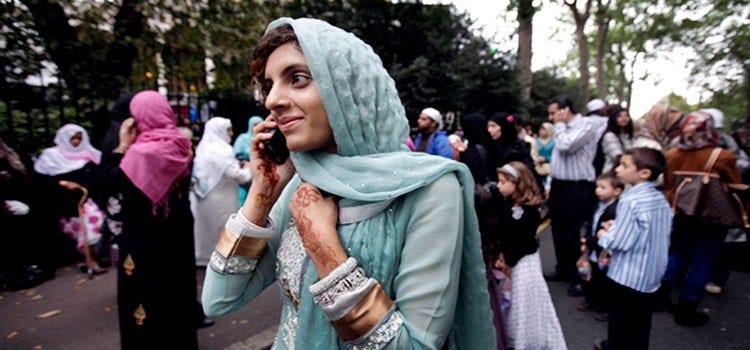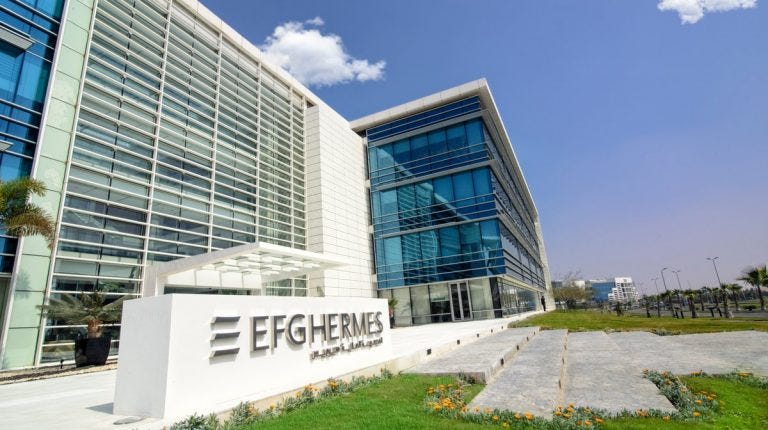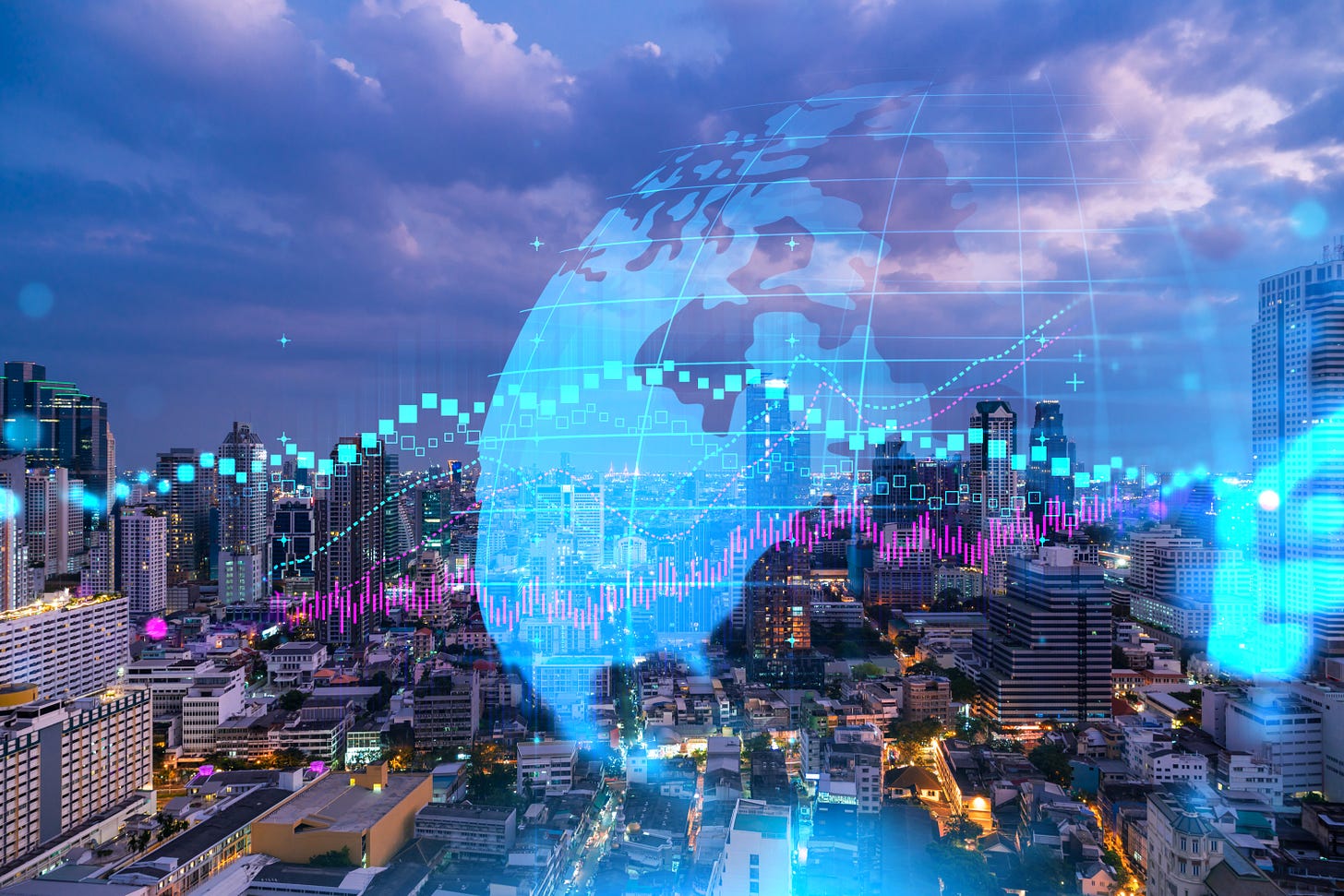Emerging Markets Daily - February 9
Instability as Commodities Prices Soar, Saudi STC Buys Pakistan Operator, Maersk Sees Supply Snarls Easing, UAE Bank to Buy Egypt's EFG, EM Rates Stabilizing
The Top 5 Stories Shaping Emerging Markets from Global Media - February 9
Global Commodities Prices Soar 50%, Fastest in 27 Years; Political Instability Could Ensue
Nikkei Asia
“Prices for crude oil, metals, grains and other internationally traded commodities are climbing at the fastest rate since 1995, raising fears of political instability in countries highly dependent on imports as seen in Turkey.”
“Commodity markets are being squeezed from two directions. On one hand, demand is booming as economies recover from the coronavirus pandemic. On the other hand, sufficient supplies to meet this demand are being hampered by geopolitical factors.”
“The Refinitiv CoreCommodity CRB Index, a composite measure of commodity prices, was up 46% on the year at the end of January. That was the largest one-year increase since 1995, when comparable data became available.”
“A broad swathe of commodity prices are on the rise, especially crude oil and other fuels. Among 22 major commodities, nine rose more than 50%, including prices for familiar commodities, such as coffee, which climbed 91%, and cotton, up 58%. Aluminum rose 53%.”
“While demand for crude oil has soared, investment in supply has been held back by the move to decarbonize economies. Natural gas prices have been pushed up by growing tensions between Russia and Ukraine. Meanwhile, disruptions to supply chains and labor shortages have exacerbated pressure on the balance between supply and demand.”
“The commodity squeeze has triggered a series of chain reactions in the market. Aluminum smelters, which use huge amounts of electricity, have been forced to cut back on output as production costs rise, creating shortages of the metal. Soaring natural gas prices have driven up the price of ammonia, a major component of fertilizer, which in turn is pushing up grain prices.”
“High commodity prices are weighing on the global economic recovery. If energy prices stay at current levels, the International Monetary Fund estimates global economic growth will be shaved by 0.5 percentage point.”
“…The impact of the commodity surge on political stability is becoming a growing concern. Turkey, which imports 70% of its energy, saw its consumer price index rise 49% on the year in January. Since the beginning of this month, the country has experienced a growing wave of worker demonstrations demanding higher pay and people protesting against soaring energy prices.”
“Of the world's 143 nations and self-governing regions, 47 relied on imports for more than half their energy needs in 2019, according to the International Energy Agency. Central Asia's Kazakhstan was roiled by violent demonstrations protesting higher liquefied petroleum gas prices at the beginning of this year.”
“…Rising commodity prices have caused political instability before. The Arab Spring in 2011 is seen as being sparked by higher food prices.”
“Resource-rich Indonesia has imposed export curbs, first on coal and then on palm oil, used in a wide variety of food and consumer products. This ‘resource nationalism,’ in which a country corrals its resources in favor of its domestic economy, is becoming another source of upward pressure on international prices.” Nikkei Asia reports.
Saudi Telecom Buys Pakistan Operator to Expand Global Footprint
Bloomberg
“The Middle East’s most profitable telecoms firm, Saudi Telecom Co., signaled a fresh push to expand beyond its core mobile-network business with an investment in a Pakistani tower company.”
“Saudi Telecom, which is controlled by the kingdom’s sovereign wealth fund, said one of its units had bought a full stake in Pakistan-based Awal Telecom, according to a statement...The Pakistan deal shows STC is looking to build new business lines and rebuild a footprint outside Saudi Arabia after forays into Indonesia and Turkey ended badly.”
“In 2020, it also proposed to acquire a majority stake in Egypt-based Vodafone Group Plc in a deal that would have been valued at $2.4 billion. However negotiations were abandoned a few months later without the reason being disclosed.”
“With the aim of diversifying into new areas, STC said this month it plans to spin off its data center, submarine cables and points-of-presence assets into a new firm. It spun off its internet services unit and listed it on the Saudi stock market last year.”
“The firm’s also building out its digital bank, STC Pay, and invested in a $500 million venture capital fund launched in 2017.” Reema Al-Othman reports.
Maersk Expects Supply Chain Snarls to Ease This Year
Wall Street Journal
“Danish container-ship company A.P. Moller-Maersk said it expects supply-chain bottlenecks to last until June and sealed a $1.68 billion deal to help shore up its inland-distribution business.”
“Maersk, which moves 17% of the world’s shipping containers on its vessels, said Wednesday that the buyout of U.S.-based Pilot Freight Services will bolster its ability to move big and bulky freight in North America. Pilot operates a network of 87 inland hubs and works with third-party trucking providers to move freight to customers.”
“The buyout is the latest in a series of acquisitions for Maersk and its competitors, such as CMA CGM SA of France, as they morph into end-to-end supply-chain providers from primarily handling ocean freight… Container-ship operators have enjoyed strong profits over the past two years, as port bottlenecks and growing consumer demand for manufactured goods helped them raise freight rates to record levels.”
“And while conditions have helped Maersk, Mr. Skou said he expects supply issues to continue through the first half of this year and gradually ease thereafter. He said demand for manufactured goods should wane as people return to work and spend more on services like travel and entertainment.” WSJ reports.
Top UAE Bank Offers to Buy Majority Stake in Egypt’s EFG Hermes
The National
“First Abu Dhabi Bank, the top lender in the UAE by assets, made a non-binding offer to buy a majority stake in Egypt's largest investment bank EFG Hermes.”
“FAB, as the Abu Dhabi bank is known, made an offer for a potential cash acquisition of a majority stake not less than 51 per cent of the company’s issued share capital with an estimated purchase price of 19 pounds ($1.21) per share, valuing EFG Hermes at 18.5 billion pounds, both entities said in regulatory filings on Wednesday.”
“…The EFG Hermes board is currently studying the offer, and the company will disclose further development, it said…FAB’s offer price is a premium of about 21 per cent to EFG Hermes' share price before its shares were suspended from trading on Wednesday. Its share value has bounced back almost 40 per cent since last year’s low in August, data compiled by Bloomberg shows.”
“…The success of the proposed transaction will mark FAB’s second acquisition in the Arab world’s most populous nation and the region's third largest economy. FAB agreed to buy Bank Audi Egypt in January 2021 and received regulatory approval in April for the deal. It began integrating the Lebanese bank's operations in May and said it expects to complete the process by 2022.”
“The Bank Audi deal completed for an undisclosed sum is expected to significantly increase FAB's footprint in Egypt and control over EFG Hermes will boost its market presence.”
“The fast-growing Egyptian market is attractive for property companies, investment houses and banks that have ample liquidity as oil prices rise. Last year, Emirates NBD, Dubai's biggest bank, opened negotiations to buy Blom Egypt operations. A consortium of Aldar Properties and one of the region’s biggest holding companies, ADQ, acquired a majority stake in Egypt’s Sixth of October for Development and Investment Company for 6.1bn Egyptian pounds in the fourth quarter of last year.”
“EFG Hermes serves frontier and emerging markets and its footprint spans 13 countries including Jordan, the UAE, Saudi Arabia, the UK, Bangladesh and Nigeria… The Egyptian bank acquired a majority stake in Arab Investment Bank in November.” Sarmad Khan and Massoud Derhally report.
Emerging Markets Signal End to Aggressive Rate-Raising Cycles
Financial Times
“As the Federal Reserve prepares to start raising interest rates as soon as next month, leading emerging economies such as Brazil and Russia are so far ahead of the US central bank they could be nearing the end of the rate-raising cycles they embarked on last year.”
“It is an unusual situation for emerging market central banks, which typically follow the Fed’s lead. But the danger posed by sharp increases in consumer price inflation prompted some policymakers to act early and aggressively — so much so, analysts warn, that high interest rates at a time of slow growth and high debt levels are jeopardising their recovery from the coronavirus crisis.”
“‘Hiking early was the right decision for most emerging market central bankers to make,’ said Adam Wolfe, EM economist at Absolute Strategy Research, a consultancy in London. But he warned some monetary policymakers might have overreacted to temporary factors such as supply chain disruption and rising food prices, slamming the brakes on growth while economies were still in need of stimulus.”
“Not counting Zimbabwe, which raised its policy rate 25 percentage points to 60 per cent in 2021, 33 developing countries have raised rates since the start of last year by a combined total of 84.55 percentage points, according to the website Central Bank News.”
“Among wealthy countries, only Iceland, New Zealand, Norway and the UK have raised rates in the same period, by a combined 2.65 points. EM central banks have got ahead of the Fed before, and it has tended to end badly. They were raising rates as the 2008-09 financial crisis neared, and before the 2011 eurozone currency crisis and the 2013 “taper tantrum” — the unexpected tightening of Fed policy that led to a heavy sell-off across EM stock and bond markets.”
“This time round, the Fed has signalled well in advance its intention to tighten policy not only by raising rates but by ending and then reversing its bond-buying programme. Better communication, analysts say, makes a repeat of the taper tantrum unlikely. But EM policymakers have much more to worry about.” Jonathan Wheatley reports.
“All great truths begin as blasphemies.” - George Bernard Shaw






